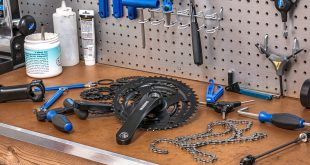A shortage of skilled workshop staff has been an issue for the cycling industry for many years. So the question is, is there a skilled labour shortage, or are there shortcomings elsewhere in the trade? Daniel Blackham spoke to those in the know to find out more
This piece first appeared in the June edition of BikeBiz magazine – get your free subscription here
THE PROBLEM
It’s no secret that there are many industries across the UK suffering from a shortage of workers, so cycling is not alone.
In November 2022, 13.3% of businesses surveyed by the Office for National Statistics reported experiencing a shortage of workers.
The percentage of businesses experiencing a staffing issues has been between 12.9% and 15.4% since October 2021, with the exception of August 2022, when the figure was 16.8%.
But what does this mean in real terms, especially for the cycling trade?
As I sit here writing this article, there are 27 live listings on the BikeBiz jobs board for workshop roles with varying levels of experience – and that is not an anomaly with more being added daily.
“It seems to have been the case ever since we got into training,” said Sean Lally, founder of training provider Cycle Systems.
“We launched Cycle Systems Academy in 2009, and we’d been approached by the people looking at setting up the TfL hire bikes, and there just weren’t enough mechanics to service 6,000 bikes. So that was set up with a lot of support from the industry.
“As cycling has grown and grown every year, with the story from 2012 and then lockdown, it seems to have outgrown the crop of current mechanics even though ourselves and all the other great people out there are training more people all the time.”
Jonathan Harrison, from the Association of Cycle Traders, speaks to retailers on a daily basis and is hearing a similar story
Harrison said: “One retailer told us that, more and more, the workshop was becoming the life force of their business and that it’s becoming increasingly difficult to find, employ and retain qualified, experienced mechanics.”
A LABOUR OF LOVE
For many people actively working in the cycling industry, they couldn’t imagine doing anything else.
“The bike industry benefits from the fact we are all passionate about bikes, not many plumbers are passionate about toilets,” said Lally.
“People stick around when they could earn double elsewhere because they love the bike and they love the industry.”
George Wallis, an Edinburgh-based bike mechanic, agrees.
“I know someone who has been a mechanic for 20-odd years and he is absolutely phenomenal, “ said Wallis.
“He can recite Shimano sheets off the top of his head. He loves bikes and will probably forever do bikes, but with 20 years experience, he is getting paid the same as someone who has just walked into the industry.”
Any discussion around salaries is often seen as a sensitive subject, but it is a key factor for staff retention.
When looking to attract new blood into the sector, there is only a finite amount of people who will work for the love of bikes.
“There’s quite a few people who trained with us to do bike mechanics and then go and do other things,” said Lally.
Lally referred to someone that had achieved a high level qualification in engineering with a skill set that specialised in complex suspension systems.
“He was on minimum wage, that’s absolutely staggering and completely unsustainable,” said Lally.
“He had spoken to management and said ‘this really isn’t good enough’ and they said ‘well times are hard and everyone’s overstocked’. Fair enough, but the company made x million in profit last year.
“So people are seeing that profits are being made but it isn’t going into salaries, and it seems to be a common problem.”
“Now, I know that it is different for small businesses and small bike shops but there definitely are companies out there that could pay more.”
Wallis believes a change in consumer attitude and mentality could also be impacting people’s love for the job.
He said: “In my first few years as a mechanic, people were coming to you for help, listening and understanding. Now it’s more like ‘I just want this done now, it needs to be done immediately’.
“There isn’t the understanding that this is a profession, it can take a while. You would not, in a million years, walk into a car garage like that, but with bike shops it seems to be fine because it’s a lower value product. It’s a weird shift.”
So, what can actually be done to start to tackle the issue? Of course, it won’t be resolved overnight but there are opportunities.
Since being founded, Cytech has delivered more than 22,000 technical training courses to candidates.
In 2023 there are a plethora of options available to people looking to get started with apprenticeships encouraged by the Government and a number of respected training providers offering courses throughout the year.
“These are not easy times for bike shops, trying to save spending as much as possible, and training is often the first expense to be cut,” said Harrison.
“Although it is frequently seen as a cost, it should be seen as an investment – the best bike businesses, those who put people through training, understand this.
“No one knows what the future holds, but bicycle mechanics are going to be more and more important as cycling increases. Bigger businesses are investing more in training but only time will tell if it has a trickle-down effect on smaller businesses.”
Harrison would also like to see employers implement progression paths for mechanics, with pay grades to match training and certification levels
He added: “Being Cytech trained and gaining the experience needed to become a Cytech master technician takes time, effort and dedication and that investment deserves recognition.”
Since relocating to Switzerland two and a half years ago, Lally has seen first-hand how a change in attitude from the consumer, thanks to e-bikes, can benefit mechanics.
He is hopeful that this could help lead the change in how workshop staff are remunerated.
“When you are selling machines that are £14,000, the customer is completely unfazed at £150 per hour in the workshop,” said Lally.
“And if you are charging £150 per hour then you can actually pay mechanics good salaries and guess what, you retain them and you have a good amount of people getting into it.”
“If you are surviving selling £300 hybrids and charging £20 per hour on labour, you’re never going to be able to pay your mechanic a good salary. So you will end up with poor mechanics or a high [staff] turnover.”
With some new customers seeing an e-bike or cargo bike as a car replacement, the scope for this sector to lead the way is promising.
Read more: Tell us your thoughts: How was business in the first half of 2023?
“Essentially what you’re looking at is completely new customers who haven’t got a frame of reference, so what they are seeing is a vehicle for their uses,” said Lally
“There’s definitely a lot of challenges, but to see some of the businesses here in Europe, especially with e-bikes, getting all this new cash into the industry, it could be just what we need.”
 BikeBiz Bicycle and cycling retail news
BikeBiz Bicycle and cycling retail news




